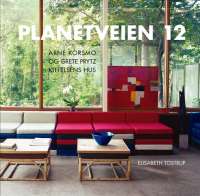Book Review: Planetveien 12 (Planet Road 12): Arne Korsmo and Grete Prytz Kittelsen’s House
DOI:
https://doi.org/10.7577/formakademisk.504Keywords:
Korsmo, Arne, Kittelsen, Grete Prytz, Planetveien 12, Oslo, Transformation, Cultural heritageAbstract
The book deals with one of postwar modernism masterpieces that complete work of art and housing. The author treats the house’s ideas, planning and construction, cooperation partners and the changes that have been made through time. Especially the latter is of high relevance in relation to our own time’s practicing of and discussions on recycling and transformation of our cultural heritage. It also contains biography and discussion of the architect’s other activities, as well as the author's interpretation of the house. Among the missing are a detailed treatment of the house as a meeting place and a more analytical review of the relationship with the partners, especially Grete Prytz Kittelsen. And not least issues related to the use versus preservation could have been devoting more attention. All in all, this is a rare good, interesting and important book. Rather than an exhaustive presentation, the book is an appetizer to what was created in conjunction with Planetveien 12 as a vehicle, and the central theme of transformation.
Downloads
Published
2013-01-06
How to Cite
Skjerven, A. (2013). Book Review: Planetveien 12 (Planet Road 12): Arne Korsmo and Grete Prytz Kittelsen’s House. FormAkademisk, 5(2). https://doi.org/10.7577/formakademisk.504
Issue
Section
Book reviews
License
Authors who publish with this journal agree to the following terms:
- Authors retain copyright and grant the journal right of first publication with the work simultaneously licensed under a Creative Commons Attribution 4.0 License that allows others to share the work with an acknowledgement of the work's authorship and initial publication in this journal.
- Authors are able to enter into separate, additional contractual arrangements for the non-exclusive distribution of the journal's published version of the work (e.g., post it to an institutional repository or publish it in a book), with an acknowledgement of its initial publication in this journal.
- Authors are permitted and encouraged to post their work online (e.g., in institutional repositories or on their website) prior to and during the submission process, as it can lead to productive exchanges, as well as earlier and greater citation of published work (See The Effect of Open Access).
- The author(s) must manage their economic reproduction rights to any third party.
- The journal makes no financial or other compensation for submissions, unless a separate agreement regarding this matter has been made with the author(s).
- The journal is obliged to archive the manuscript (including metadata) in its originally published digital form for at least a suitable amount of time in which the manuscript can be accessed via a long-term archive for digital material, such as in the Norwegian universities’ institutional archives within the framework of the NORA partnership.
The material will be published OpenAccess with a Creative Commons 4.0 License which allows anyone to read, share and adapt the content, even commercially under the licence terms:
This work needs to be appropriately attributed/credited, a link must be provided to the CC-BY 4.0 licence, and changes made need to be indicated in a reasonable manner, but not in any way that suggests that the licensor endorses you or your use.



